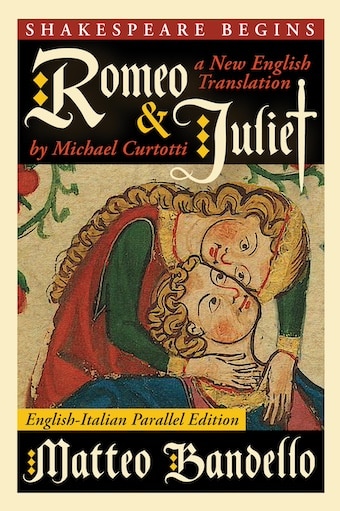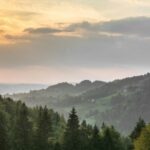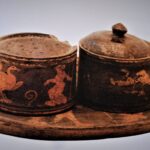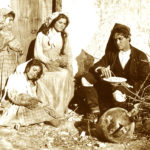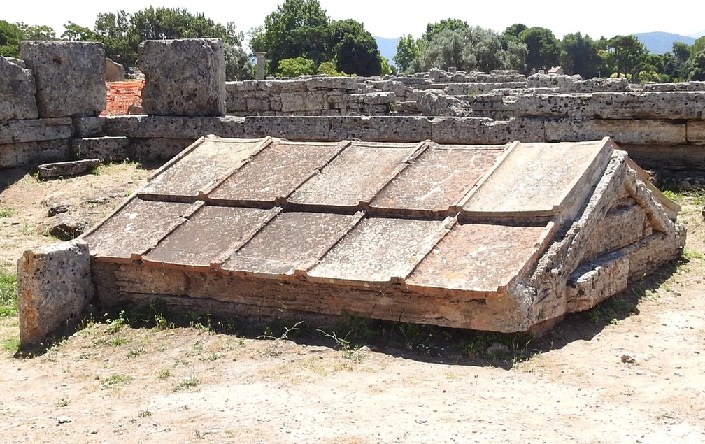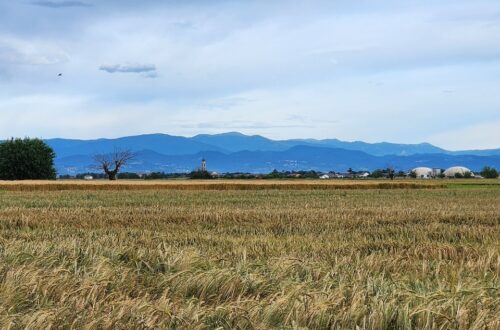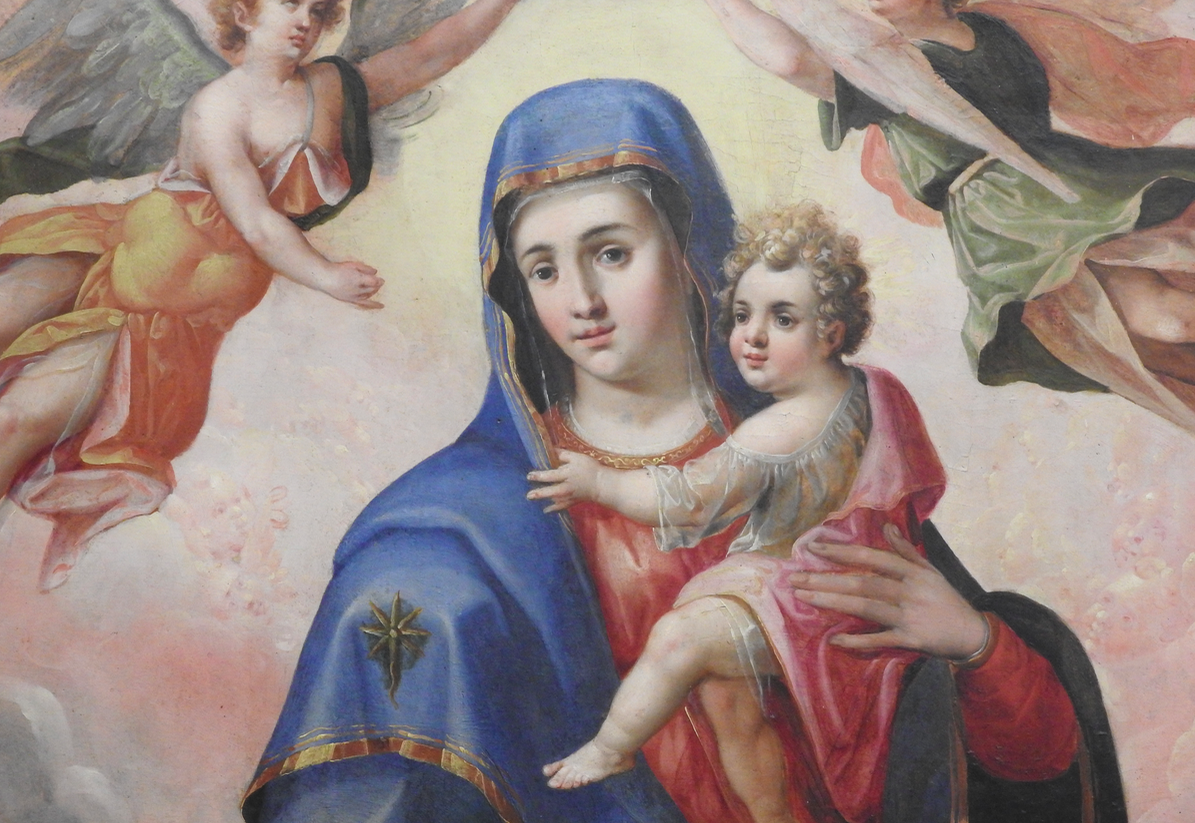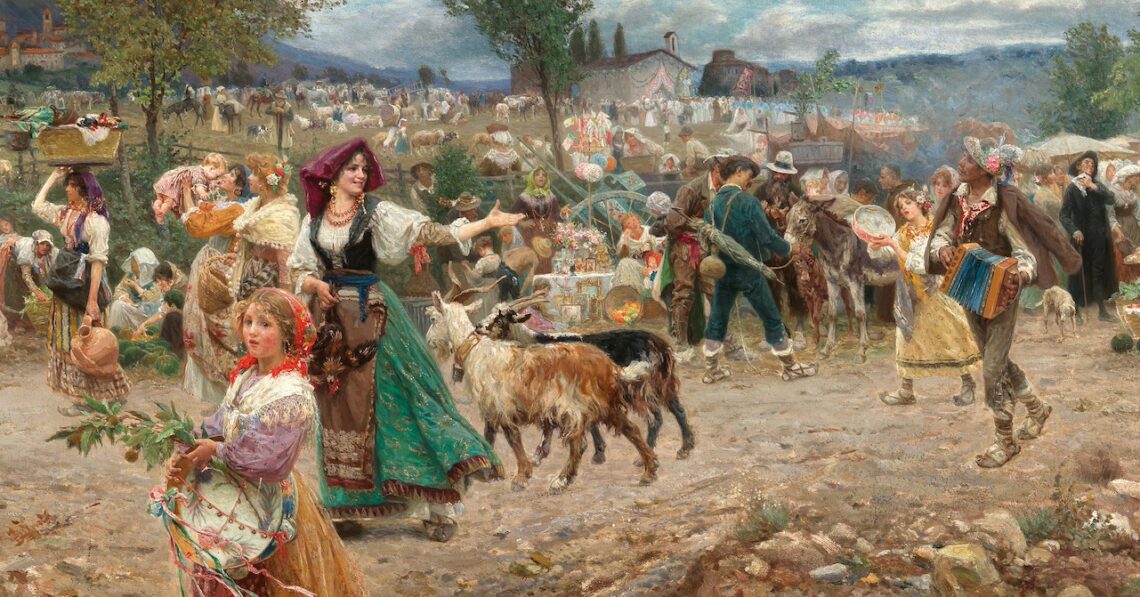
Giacomo Leopardi’s Il Sabato del villaggio – Village Saturday
La donzelletta vien dalla campagna,
In sul calar del sole,
Col suo fascio dell’erba; e reca in mano
Un mazzolin di rose e di viole,
The maiden returns from the meadows,
At setting of sun,
Bringing her bundle of herbs; and in hand,
A garland of roses and violets,
Onde, siccome suole,
Ornare ella si appresta
Dimani, al dì di festa, il petto e il crine.
And, as is custom,
The next day, she prepares and adorns
For the festival, her breast and her hair.
Siede con le vicine
Su la scala a filar la vecchierella,
Incontro là dove si perde il giorno;
E novellando vien del suo buon tempo,
Quando ai dì della festa ella si ornava,
Ed ancor sana e snella
Solea danzar la sera intra di quei
Ch’ebbe compagni dell’età più bella
Then sitting with neighbours
On the steps, the old woman spinning,
A gathering there, to pass the day,
And, as they chatter, in its own time,
Out comes when on feast day it was she with adornment,
With her body still sturdy and slender
And she would dance in the evening
Among those of her era, most fair
Già tutta l’aria imbruna,
Torna azzurro il sereno, e tornan l’ombre
Giù da’ colli e da’ tetti,
Al biancheggiar della recente luna.
The air has been darkened,
Serenity and shadows in blue
Returning from hill and roof,
At the rising of the young moon.
Or la squilla dà segno
Della festa che viene;
Ed a quel suon diresti
Che il cor si riconforta.
Now the chimes give signal
For the feast to begin
And from that sound you’d say
That thee heart takes comforted.
I fanciulli gridando
Su la piazzuola in frotta,
E qua e là saltando,
Fanno un lieto romore:
E intanto riede alla sua parca mensa,
The children shouting
In the plaza streaming
And here and there leaping:
Bursting in joyful song:
As they go to their garden meal
Fischiando, il zappatore,
E seco pensa al dì del suo riposo
Poi quando intorno è spenta ogni altra face,
E tutto l’altro tace,
Odi il martel picchiare, odi la sega
Del legnaiuol, che veglia
Nella chiusa bottega alla lucerna,
E s’affretta, e s’adopra
Di fornir l’opra anzi il chiarir dell’alba.
Questo di sette è il più gradito giorno,
The farmer, whistling
Thinks to himself of his day of rest
Then when all about every face departs,
And all else falls to silence,
Hear the hammer strike, hear the saw
Of the carpenter, who keeps vigil
By lantern lit in his workshop
And he hastens to apply his skills
To finish the work before break of day
To whom of the seven, this day is most welcome,
Pien di speme e di gioia:
Diman tristezza e noia
Recheran l’ore, ed al travaglio usato
Ciascuno in suo pensier farà ritorno.
Full of hope and joy
Tomorrow sadness and trouble
Bear the hours, and the suffering
Each in their thought returns.
Garzoncello scherzoso,
Cotesta età fiorita
È come un giorno d’allegrezza pieno,
Giorno chiaro, sereno,
Che precorre alla festa di tua vita.
Godi, fanciullo mio; stato soave,
Stagion lieta è cotesta.
Altro dirti non vo’; ma la tua festa
Ch’anco tardi a venir non ti sia grave.
The mischievous boy,
In that age of blossom
Is like a day full of joy,
A day clear and serene,
That augurs the joys of his life.
Delight, my boy, this gentle state,
This happy and cheerful season.
More I would not tell thee; even if your festival
Delays to come, it will not trouble thee.
Image
Cesare Tiratelli (1864-1933, The Village Feast


